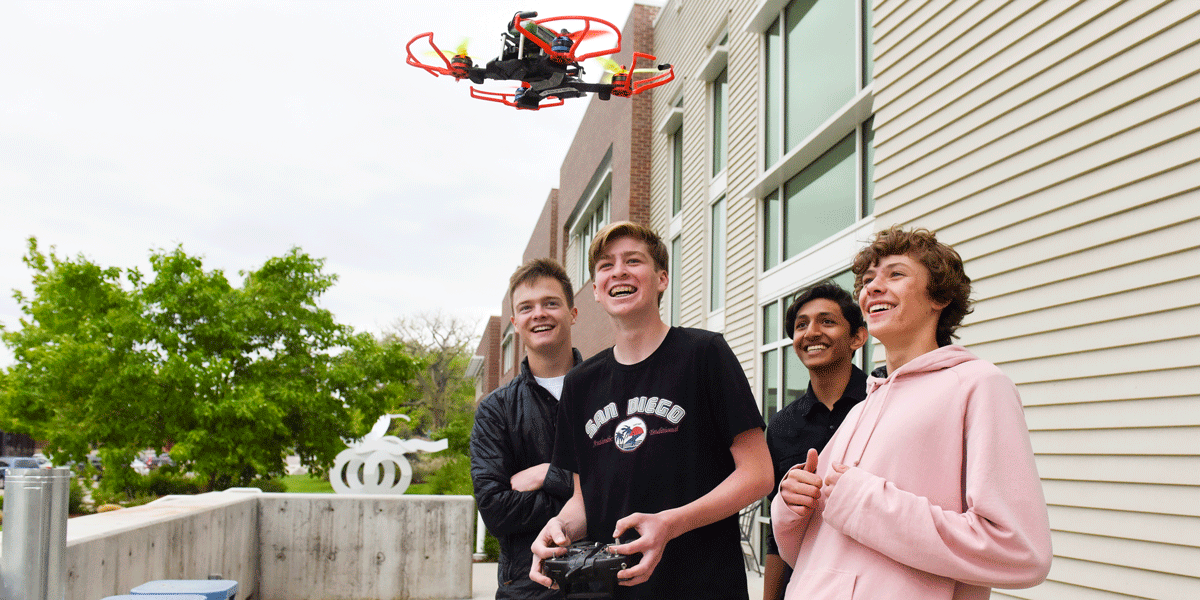Student agency is an oft-used phrase in educational circles these days. More and more educational leaders are promoting the idea that students, especially in high school, ought to have more voice in what they learn and how. But how exactly should this be encouraged? How might we make students more independent about their own learning? How might we support them as they self-direct their way through areas of inquiry?
Developing student agency is something we take seriously in the Colorado Academy Upper School. From reader’s choice assignments to open-ended essay questions, to self-directed research and lab projects, to the REDI Lab for juniors, we are working hard to provide students with the opportunities to take control of their own education and follow their interests and passions. Whether supporting an independent study in sports and statistics or supporting Seniors in their community impact projects, we have the bandwidth and expertise to allow for the personalization of our program when the situation is right.
When to take off the training wheels?
We try not to yank off the training wheels too early, however. There are potential pitfalls to giving too much freedom too soon. One resource I consulted, the online Educational resource called Renaissance, summarizes nicely all the things “student agency is NOT…
- A free-for-all for students: They need [a teacher’s] guidance, and sometimes too many choices can be counterproductive instead of inspiring.
- Lacking accountability: Students must demonstrate mastery of concepts and skills.
- A replacement for an expert teacher: While students choose their own direction, they will still require course-correction along the path to mastery.”
I couldn’t agree more with these caveats to student agency. In some cases, a self-directed student may wander in the wilderness of agency for too long and meet with only frustration. As with most things in education, balance is the key.
What are the parameters?
So there must be some parameters. We know that the vast majority of younger students cannot be expected to exercise agency fully. They simply don’t have the experience or foundational education yet. This is a maturation process and one that takes time and practice, not to mention the brain development that needs to occur. Thus, we see the Ninth and Tenth Grade years as essential building blocks. The Upper School curriculum requires that every student take classes like Global Perspectives, Chemistry, and American Literature, just to name a few. They also take math and world language classes that help them develop essential skills in those subject areas.
In those early high school classes we look to provide opportunities within a narrow framework for personalized learning and student agency. For example, we might offer a range of supporting topics during our unit on Immigration—all of which the teacher knows will be fruitful for student exploration—and let the students choose from among them based on their interests. These types of assignments and experiences build capacity for student agency so that by Junior year we can offer a much broader range of choice, including the temptation of “design your own topic” with some assistance from the teacher.
How does REDI Lab offer student agency?
In our own REDI Lab, a trimester-long program for Juniors during third trimester, students self-select into an environment that allows them to dive deeply into an area of choice. They enter the trimester knowing that they will be afforded the rare opportunity to work with teachers and fellow students who are all fully engaged in the idea of independent student learning. But even these students have an adjustment period.
Most spend the first few weeks in REDI Lab just getting acclimated to the new environment of freedom. They might turn to co-directors Tom Thorpe and Paul Kim to ask, “What do you think I should do?” To which the response is some form of, “What do you want to do?” Our dutiful, hard-working students have been conditioned primarily to follow the path laid out for them by their teachers, so it takes them a little bit of time to adjust to a new reality of self-directed learning. REDI Lab provides the time and space to do just that.
By the time the students are publicly presenting their projects at the end of the May, they have gained confidence in their ability to self-direct and can speak openly about their process and the learning they have done. We see true ownership of the final demonstrations of learning.
It’s all part of the academic growth process here at Colorado Academy. By allowing some individual choice and promoting student agency, we are setting our students on a strong path to control their own educational destiny.
